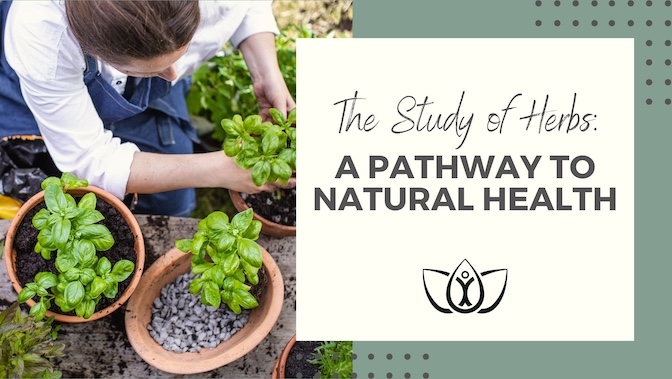.png) The study of herbs, known as herbology or herbal medicine, has been a cornerstone of human health and wellness for thousands of years. By understanding the history, characteristics, and uses of herbs, we can appreciate their role in holistic health practices and integrate them into modern lifestyles. Read on to explore the fascinating study of herbs, its historical roots, and Trinity's Certified Master Herbalist program.
The study of herbs, known as herbology or herbal medicine, has been a cornerstone of human health and wellness for thousands of years. By understanding the history, characteristics, and uses of herbs, we can appreciate their role in holistic health practices and integrate them into modern lifestyles. Read on to explore the fascinating study of herbs, its historical roots, and Trinity's Certified Master Herbalist program.A Brief History of the Study of Herbs
Archaeological evidence suggests that herbal remedies were used as far back as 60,000 years ago. Ancient civilizations such as the Egyptians, Greeks, and Chinese developed extensive systems of herbal medicine. The Ebers Papyrus, an Egyptian medical document from 1500 BCE, contains over 700 herbal formulas. Similarly, the ancient Indian texts of Ayurveda and the Chinese “Shen Nong Ben Cao Jing” are foundational texts for herbal knowledge in their respective cultures.
The rise of modern pharmaceuticals overshadowed herbal medicine, but in recent decades, there has been a resurgence of interest in natural remedies and the study of herbs. Today, herbal medicine is studied and practiced globally, with a focus on combining traditional knowledge with modern scientific research.
The rise of modern pharmaceuticals overshadowed herbal medicine, but in recent decades, there has been a resurgence of interest in natural remedies and the study of herbs. Today, herbal medicine is studied and practiced globally, with a focus on combining traditional knowledge with modern scientific research.
Characteristics of Herbs
Herbs are plants that contain bioactive compounds capable of influencing human health. These compounds can include alkaloids, flavonoids, terpenes, and saponins and offer unique therapeutic properties and applications. Some key characteristics of herbs include:
Adaptogenic Properties: Herbs like ashwagandha and rhodiola help the body adapt to physical, mental, and environmental stressors, promoting overall balance.
Anti-Inflammatory Effects: Herbs such as turmeric and ginger are rich in curcumin and gingerol, compounds that can reduce inflammation and support joint and cardiovascular health.
Antioxidant Benefits: Herbs like rosemary and green tea contain powerful antioxidants that combat oxidative stress, which is linked to aging and chronic diseases.
Immune-Boosting Qualities: Echinacea and elderberry are known to enhance the immune system and reduce the severity of colds and flu.
Aromatic Qualities: Herbs such as peppermint and lavender can be used in aromatherapy to relieve stress, enhance mental clarity, and improve sleep.
Herbs are typically categorized based on their primary uses, such as culinary, medicinal, or aromatic purposes, though many herbs have multiple possible uses.
Anti-Inflammatory Effects: Herbs such as turmeric and ginger are rich in curcumin and gingerol, compounds that can reduce inflammation and support joint and cardiovascular health.
Antioxidant Benefits: Herbs like rosemary and green tea contain powerful antioxidants that combat oxidative stress, which is linked to aging and chronic diseases.
Immune-Boosting Qualities: Echinacea and elderberry are known to enhance the immune system and reduce the severity of colds and flu.
Aromatic Qualities: Herbs such as peppermint and lavender can be used in aromatherapy to relieve stress, enhance mental clarity, and improve sleep.
Herbs are typically categorized based on their primary uses, such as culinary, medicinal, or aromatic purposes, though many herbs have multiple possible uses.
Uses of Herbs
Herbs play versatile roles in supporting health and well-being. Some common uses include:
- Health Support: Herbal teas, tinctures, and supplements address ailments ranging from digestive discomfort to immune support. For instance, chamomile tea can calm the digestive system and promote sleep, while milk thistle supports liver detoxification.
- Culinary Applications: Herbs like basil, oregano, and parsley not only enhance the flavor of dishes but also provide antioxidants, vitamins, and minerals that support overall health.
- Skincare and Beauty: Ingredients like aloe vera and calendula are prized for their anti-inflammatory and healing properties, making them staples in natural skincare products.
- First Aid: Arnica and comfrey are commonly used topically to reduce bruising and promote the healing of minor injuries.
Integrating Herbology into Holistic Health Practices
Herbology complements other modalities in holistic health, such as nutrition, acupuncture, and energy healing. By understanding the energetic and physiological properties of herbs along with the client’s health history, foundational lifestyle choices, and current concerns, practitioners can create personalized wellness plans to support the client while addressing the root causes of imbalances.
For example, a holistic practitioner might:
For example, a holistic practitioner might:
- Recommend herbal teas and mindfulness practices to reduce stress, such as drinking chamomile tea on work breaks and meditating every evening for 10 minutes to enhance relaxation.
- Suggest adaptogenic herbs like Rhodiola or holy basil and walking every day to improve resilience during periods of physical or emotional challenges.
- Incorporate detoxifying herbs, like dandelion root or burdock, in conjunction with drinking enough water to support liver and kidney function.
- Suggest herbal poultices made from comfrey or plantain for wound care and pain relief, along with eating nutrient-rich foods to support the recovery process.
- Blend herbs into aromatherapy practices, such as diffusing eucalyptus oil for respiratory health or bergamot for mood enhancement.
What You’ll Learn in the Certified Master Herbalist Program at Trinity
In our 16-week CMH program, you’ll take an in-depth look at the characteristics, origins, nutritional qualities, and applications of herbs from all over the world. Additionally, you will learn about herbal practice, the modern commercial market for herbs and herbalists, and delivery methods of herbs—capsules, tinctures, salves, poultices/fomentations, and teas. In our program, we discuss how herbs and plants can be consumed as food, myths and misconceptions surrounding herbs, and how to develop and build your own Materia Medica.
Our CMH program is 100% online and provides the flexibility you need as a busy parent or practicing professional. Our courses are delivered in the online classroom, Canvas, and taught by instructors with experience in the natural health industry. You will be required to complete assignments and pass exams to complete each course. During your studies, you will have the opportunity to connect and learn from fellow classmates through discussions and activities and meet Trinity graduates on our exclusive social media platform, Trinity Connect. At the conclusion of your studies, you will receive the title Certified Master Herbalist and can obtain additional titles by board certifying with the American Association of Natural Wellness Practitioners (AANWP).
Our CMH program is 100% online and provides the flexibility you need as a busy parent or practicing professional. Our courses are delivered in the online classroom, Canvas, and taught by instructors with experience in the natural health industry. You will be required to complete assignments and pass exams to complete each course. During your studies, you will have the opportunity to connect and learn from fellow classmates through discussions and activities and meet Trinity graduates on our exclusive social media platform, Trinity Connect. At the conclusion of your studies, you will receive the title Certified Master Herbalist and can obtain additional titles by board certifying with the American Association of Natural Wellness Practitioners (AANWP).
Conclusion
The study of herbs bridges ancient wisdom and modern science, offering a natural approach to health and wellness. By delving into herbology, we not only gain tools for healing but also deepen our connection to the natural world. Whether you are a lifelong student of herbology or simply curious about its benefits, exploring the rich history and diverse applications of herbs can be a transformative journey toward better health and balance. Consider enrolling in our 16-week Certified Master Herbalist program to gain the knowledge and credentials you need to support others on their wellness journeys. Call 800-428-0408, option 2, to speak with an enrollment specialist or visit trinityschool.org/programs/cmh to learn more and enroll.
References:
https://pubmed.ncbi.nlm.nih.gov/15586450/
https://www.proquest.com/docview/1521700583?sourcetype=Scholarly%20Journals
https://www.nlm.nih.gov/about/herbgarden/list.html

This article was reviewed by Lauren Ameling, DC, BCND. Dr. Lauren Ameling is a 2006 graduate of Logan University, where she earned a Doctor of Chiropractic and a Bachelor of Science in Human Biology. She is a chiropractic physician certified in acupuncture and naturopathy, specializing in traditional Chinese medicine, pregnancy and pediatric care, and kinesiology. Dr. Ameling has worked in healthcare education since 2010 and serves as the Chief Operating Officer of Trinity School of Natural Health.

References:
https://pubmed.ncbi.nlm.nih.gov/15586450/
https://www.proquest.com/docview/1521700583?sourcetype=Scholarly%20Journals
https://www.nlm.nih.gov/about/herbgarden/list.html

This article was reviewed by Lauren Ameling, DC, BCND. Dr. Lauren Ameling is a 2006 graduate of Logan University, where she earned a Doctor of Chiropractic and a Bachelor of Science in Human Biology. She is a chiropractic physician certified in acupuncture and naturopathy, specializing in traditional Chinese medicine, pregnancy and pediatric care, and kinesiology. Dr. Ameling has worked in healthcare education since 2010 and serves as the Chief Operating Officer of Trinity School of Natural Health.


